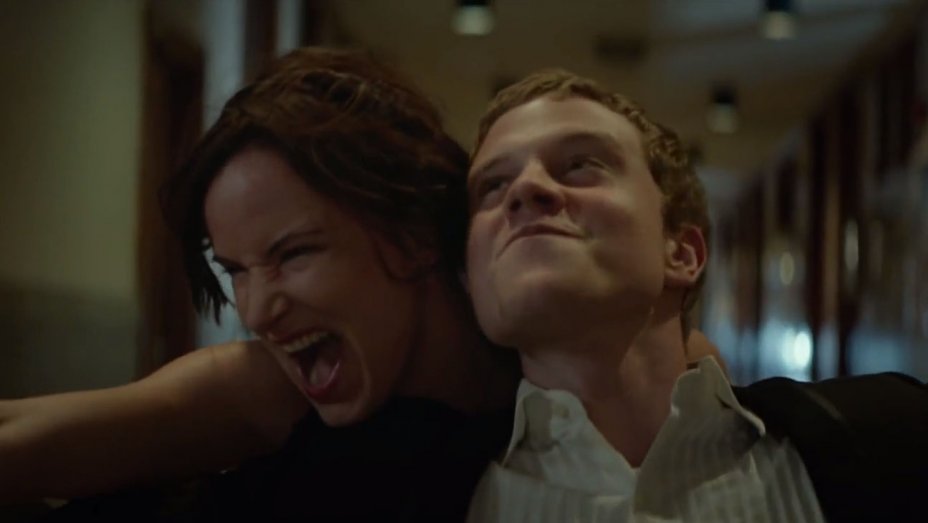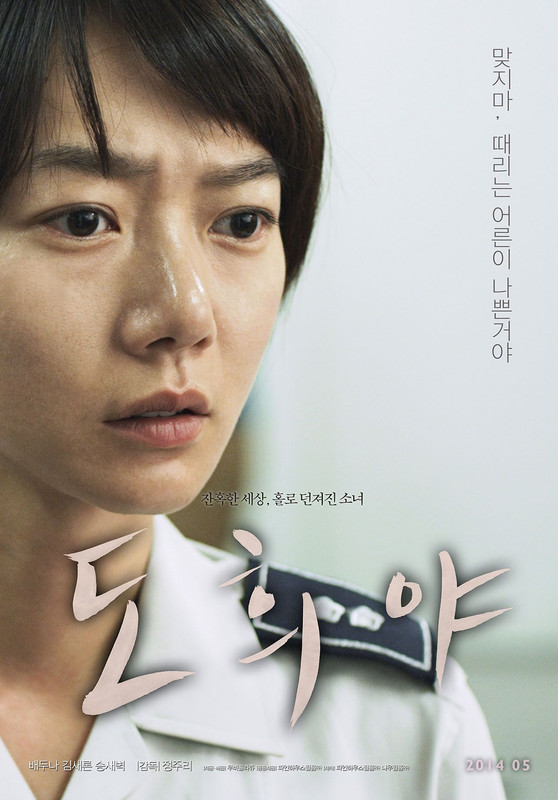Dir: Jen McGowan
Casting is a strange sort of alchemy. Sometimes you can imagine all sorts of alternatives in roles, other times, there seems only to be one correct choice for a part, and that's very much the case with Juliette Lewis in Kelly And Cal. It's tough to imagine any actress in Hollywood better suited to the part of a former riot grrrl turned suburban housewife in her late 30's, struggling with a new baby, distant from her husband, who finds a connection with a disabled teenager (Cal, played by Jonny Weston) who lives next door. This connection leads to trouble when Cal falls for Kelly and begins acting out.
Juliette Lewis is one of those actresses whose talent has often outstripped her roles, it's been too long since we've seen her in a lead, with a part she can get her teeth into. She has that in Kelly, and she grabs it with both hands. Lewis' offscreen persona plays into the part. There has always been an edge to Lewis, it has been seen in dangerous roles (most notably Natural Born Killers), but latterly she has channeled it into fronting a rock band, and this gives an authenticity to Kelly's past. The little we hear of Kelly's former band, Wetnap, is good and Lewis is clearly doing the vocals, which lends a multi-layered energy to the scene where she first plays their tape for Cal. This energy also allows us to buy in to why Kelly is drawn to Cal. He's rude and surly, but she seems to recognise a little of the rebellious streak that she has had to mute in herself, and perhaps the chance to recapture it in some small way. Lewis is also very good at playing Kelly's struggles with being a new parent (she may even have post-natal depression, though the film never comes out and says that). It's easy to read and to sympathise with her frustrations and Lewis carries herself with a weariness common to most new parents.
Jonny Weston is also good as Cal, but he's not quite up to some of the dramatic challenges posed by Cal's more extreme acting out towards the end of the film (this is also partly the fault of Amy Lowe Starbin's screenplay). In the first two acts Weston impresses, making Cal's bluntness understandable and his fumbling, obvious, crush on Kelly just the right side of charming rather than creepy. In one of the film's best sequences he takes her on a surprise date, a sort of replacement for her rubbish prom of 20 years ago and the one he won't be attending. It's cheesy in just the right way; you can believe this earnest kid trying to impress Kelly this way. It also has the film's biggest laugh, if you're old enough to remember a certain song from the first time round.
Unfortunately the film never matches up to these performances and begins to collapse around them come the third act. The other characters (Kelly's solidly decent husband, her stereotypically interfering mother in law and sister in law) are lightly sketched and feel more like dramatic props than real people. This also begins to sneak in to the writing of Cal, whose personality switches quite dramatically after his and Kelly's 'date'. This all conspires, along with director Jen McGowan's competent but rather unexciting visuals, to make Kelly and Cal less than it could be. It's a strong showcase for Juliette Lewis and it's great to see her back, front and centre of a film, but the film itself ends up being quite forgettable.
★★★
★★★
El Niño
Dir: Daniel Monzon
How many films have you seen where a driven cop has been going after bringing down a target for years and knows he has one last shot, or he's going to get fired? How many films have you seen where a young upstart criminal (who's not so bad really, all he wants is some startup cash so he can sail off into the sunset with his girlfriend), gets caught between that cop and his target? Yes, I've seen about 200 of those as well. Here's another. It's in Spanish this time.
El Niño isn't a terrible film. It's got a solid cast. The cops are led by Luis Tosar; as forceful and no bullshit as ever, anchoring the movie with his down to earth grit and his boss is played by Sergi Lopez, clearly not stretched here, but still one of Spanish cinema's most reliable talents. Equally decent work is put in by Barbara Lennie as Tosar's partner and Jesus Castro, Jesus Carroza and Saed Chatiby as the three young small-timers caught between a cop and a hard place. These performances basically sum up the movie; they are all technically decent, but there's nothing terribly exciting, nothing new, in any of them.
Daniel Monzon and co-writer Jorge Guerricaechevarría could use some work on their pacing. After a strong opening that introduces Tosar's Jesus and his driving ambition to bring down this drug dealer Monzon allows him to vanish for some time as he sets up the three young dealers. This would be fine, except that every beat is so hackneyed, so utterly standard, that it feels like being shown the Cliff Notes on lazy character development for half an hour rather than being introduced to three distinctive characters.
When Monzon starts to draw the stories back together and to inject a little more pace and action into the narrative, El Niño does briefly catch light, particularly with a chase between a boat and a helicopter which ends with a pretty spectacular underwater sequence. This feels like, and probably should be, the climax, but Monzon drags his feet, bolting on another 40 minutes of padding, taking what might have been a bog standard but inoffensive 95 minute film to a bloated and wheezing 135 minutes of creaky cliché.
I'm quite surprised to see this film in the festival. It's a barely competent genre exercise, the fact it's not in English doesn't change that.
★★
★★
A Girl At My Door [This review was previously published during Cannes]
Dir: July Jung
Like many fans of South Korean cinema I have, over the past decade, been charmed and impressed by Bae Doo-Na, who is one of the biggest stars in her home country. It is fair to say, however, that Bae has a rather set onscreen persona; playing the charming, slightly kooky ingenue in many of her films. That's no bad thing, I've frequently compared Bae's onscreen charm and magnetism with that of Audrey Hepburn, which isn't something I do lightly. However, A Girl At My Door (Dohee-ya in Korean) seems to mark a real shift. At 34 Bae seems to be wanting to finally play a real grown up and this often tough drama offers her that chance.
Bae plays Young-Nam, as the film begins she is moving to a small town to become their Police chief. There are hints throughout the first half of the film that this is because of a problem in her past, which saw her sent away from Seoul. When she arrives Young-Nam soon meets 13 year old Do-Hee (Kim Sae-Ron), who is picked on by the local kids and abused by both her father Yong-Ha (Song Sae-Byeok) and her grandmother. Doo-Hee becomes very attached to Young-Nam and, after an especially bad beating, Young-Nam takes the young girl in. This causes tension in the town, especially when Young-Nam's past comes home to roost.
A Girl At My Door, with its non-descript title and (relatively) lighter first hour, managed to trick me when it came to what kind of film it would be. For ten minutes at the beginning we might be about to watch a fish out of water comedy about a big city cop coming to a backwater. Then there is a turn for the dramatic as Young-Nam's problem drinking is revealed, but as the story between her and Do-Hee takes centre stage it seems as though we're actually going to be seeing a film about how an unexpected surrogate parent comes into the life of a troubled kid. None of these ideas is especially original, and nor, really, is the direction of the film's third act, but the way that writer/director Jung manages to continually set us up for one thing before turning in a slightly different direction keeps things interesting and works to the film's advantage.
Towards the start and the end of the film, Jung slathers on the abuse just a little hard, it's not that graphic until one late scene that I'm surprised she even got away with a clear implication of, but it comes up so regularly at times that there is a slight tragedy porn feeling. What saves the film in these moments, as well as from a rather OTT performance from Song Sae-Byeok, is the fact that the two leads are outstanding.
Bae seems to have made a conscious choice here to shift her image and while Song spends most of his scenes yelling abuse at whoever he's sharing the screen with at that moment, she dials everything back for a reserved performance that is sometimes resolved and sometimes porcelain fragile. There is no coasting on her looks and her charm here, even as Young-Nam comes to care for Do-Hee there is a sense that the older woman is putting up a wall (why she may be doing so is another of the interesting shifts in the film). Throughout, Bae does some wonderfully subtle physical acting, whether it's to do with Young-Nam's relationship to Do-Hee or to alcohol. We see the complexities etched in particularly fine detail in what emerges as one of the film's key scenes, when Do-Hee asks if she can get in the bath with Young-Nam.
Bae might simply have walked off with the movie thanks to her performance, but 13 year old Kim Sae-Ron, who may be known to western audiences as the little girl in The Man From Nowhere, gives her a serious run for her money and establishes herself as an actress to keep an eye on as she and her roles mature. What Kim manages to capture with great clarity here is the sense of a child suddenly growing up very quickly, perhaps thanks to a new influence in her life, perhaps due to the temporary absence of an old one.Jung's screenplay and Kim's performance both advance Do-Hee's character and her process of growth incrementally. It's incremental enough that it's not that noticeable from one scene to the next, but it's credible that she changes as much as she does. There is also a sense, which towards the end of the film another character also gets, that there is something underlying the broken exterior of the Do-Hee we first meet, and this is something that Kim puts across subtly but strongly. All in all it's a remarkably nuanced piece of acting for such a young performer.
While this is a creditable feature debut for July Jung there are still a few cracks that make it feel like a debut. Visually the film is strong, and even if it doesn't yet speak to a deeply personal eye it has several very striking images (a repeated motif of Do-Hee dancing outside, for example). The screenplay can be more problematic. For instance, Young-Nam's drinking feels like it should be a major theme, but it is largely shunted aside; serving mostly as a misdirection early on. Also problematic is the fact that when, with about 35 minutes to run, the film takes a not entirely unexpected turn into very dark territory it doesn't quite have the courage of its convictions. This means that it strains credulity more than a little in both the speed and the ease with which it finds its ending. It's not ruinous, but it's less complex than I'd like, given the preceding 100 minutes.
Overall, A Girl At My Door has its flaws, but when it concentrates on its two central performances it absolutely commands the attention and it's well worth seeing, especially for fans of Bae Doo-Na who want to see her branch out.
★★★
★★★





No comments:
Post a Comment